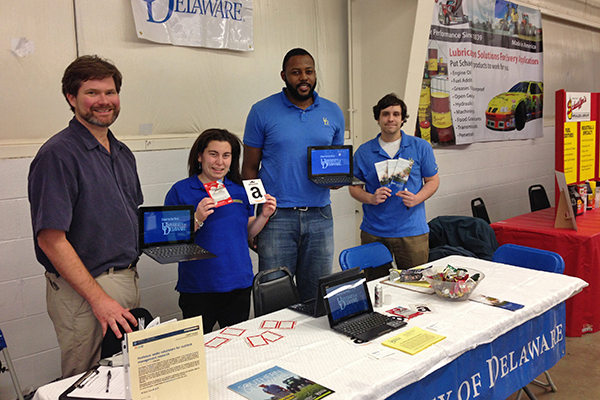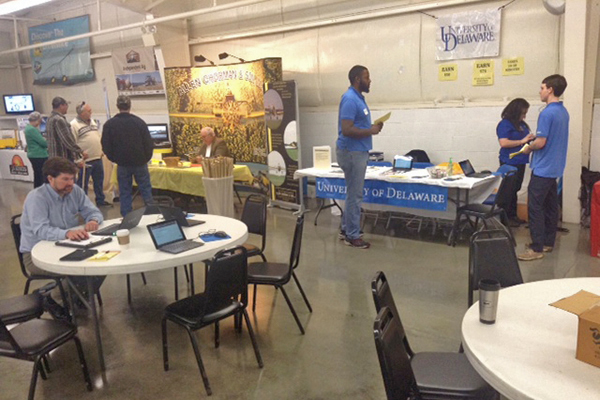


Ag Week research
UD Cooperative Extension aids UD researcher at Delaware Ag Week
1:02 p.m., Feb. 10, 2014--Sometimes, an offer can seem too good to be true. The University of Delaware’s Kent Messer was worried that would be the case with his latest research project — one that promised land owners in the state who owned more than 10 acres of land $50 simply for completing a 30-minute survey and offered up to $40,000 worth of funding to support cost share and landowner incentives to help implement nutrient management practices on private property.
Luckily for Messer and his research team, University of Delaware Cooperative Extension — in conjunction with Delaware State University Cooperative Extension and the Delaware Department of Agriculture — was holding Delaware Ag Week in Harrington at the Delaware State Fairgrounds and welcoming around 1,900 visitors, many of them land owners.
Research Stories
Chronic wounds
Prof. Heck's legacy
“We were able to piggyback on Extension’s work and trust with the farmers,” said Messer, Unidel Howard Cosgrove Chair for the Environment in the Department of Applied Economics and Statistics (APEC). “Our research was more believable because we were at Ag Day.”
“This is an excellent example of outreach and engagement within UD,” said Michelle Rodgers, associate dean for Cooperative Extension in the University’s College of Agriculture and Natural Resources. “Cooperative Extension is a key partner in the Ag Week event which provided over 97 educational sessions with over 1900 attendees. Students involved in the survey were introduced to Cooperative Extension programming and through the event were able to meet face to face with their desired survey participants. This is was a win-win for the researchers and the research participants.”
Messer’s project is sponsored by the U.S. Department of Agriculture (USDA) Economics Research Service and at Ag Week, his team conducted a field experiment on nutrient management practices and landowners’ attitudes toward and adoption of those practices.
The USDA project had funding to support cost share and landowner incentives to help implement nutrient management practices on the ground. Messer’s team asked landowners about conservation buffers, areas that are vegetated along streams and ditches either by grass or forest, and asked the landowners how much they would be willing to share the costs of those practices.
Messer singled out Jennifer Volk, extension specialist in the Department of Plant and Soil Sciences, for helping to identify practices relevant to Delaware for the survey that are not currently available for cost share. “We didn’t want to fund practices that were already supported by state or federal programs; we want to learn about landowners’ attitudes and behavior related to new practices,” said Messer.
Messer said he combined this project with another one of his National Science Foundation (NSF) projects that focuses on the Murderkill Watershed, which has issues surrounding nutrients. If participants had property in the watershed, they were eligible for an extra $25 for taking the survey.
Survey team members included Walker Jones, a master’s degree student in the College of Agriculture and Natural Resources (CANR), Maik Kacinski, a postdoctoral researcher in APEC, Linda Grand and Seth Olson, both seniors in the Department of Applied Economics and Statistics, and Michael Griner, a student from Delaware Technical Community College.
The research team set up shop in Harrington for four days during Ag Week. With four and sometimes six tablet computers available for survey participants, the team members set up through each day of Ag Week and was able to attract 80 people to participate in the survey, which Messer called a “home run.”
“One of the reasons I love Ag week is that it helped ensure our validity. Our booth had a bright blue University of Delaware sign on it. We were in a UD event. Because, in many cases, you could say that this was a too good to be true offer -- $50 for a 30-minute survey. We’ll pay up to $40,000 for you to do nutrient management on your land. Most people will see that survey and throw it in the trash because they think there must be a catch.”
Messer said that he was very happy to be able to conduct his research survey at a Cooperative Extension event.
“I’m fundamentally committed to good research that has Extension components. I think that’s a wonderful pillar of the land grant and these are exciting opportunities to collaborate. This is a time when the Extension efforts helped the research project,” said Messer. “We wouldn’t have been successful without having Extension do what it does and having this program that is servicing the landowners. And we were really just able to take advantage of it and participate in it.”
The next steps for Messer and his team include collecting data via mail from participants who were not at Ag Week and finalizing the results of the study.
Article by Adam Thomas









